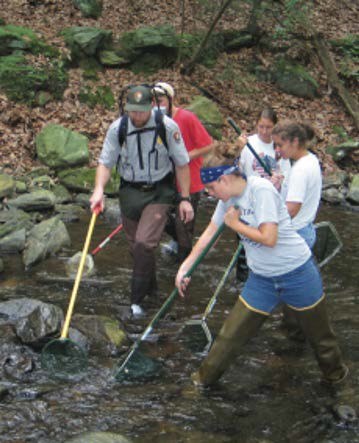Last updated: August 8, 2023
Article
The Youth Conservation Corps at Catoctin Mountain Park
Content excerpted from:Elder-Norquist E. 2020. Catoctin Mountain Park Administrative History Update. Organization of American Historians for National Park Service.
In 1971, Catoctin Mountain Park became one of the first pilot residential program sites to host a group of young people as part of the Youth Conservation Corps.

NPS
Founding the Youth Conservation Corps
The Youth Conservation Corps (YCC) is a program that was developed out of the modern environmental movement. First introduced in Congress in 1957, the YCC bill was signed into law by President Nixon on August 13, 1970. Per the enabling legislation, boys and girls ages 15 to 18 completed conservation projects on public lands, gained firsthand experience in resource management, and attained an understanding of and an appreciation for America’s outdoor heritage and environment.The Department of the Interior (DOI) and the United States Department of Agriculture (USDA) were charged with coordinating the YCC program. When selecting applicants, administrators considered racial, economic, and social distribution. Available housing, potentially meaningful projects, and geographical distribution were considered when selecting site locations.
The First YCC Term at Catoctin Mountain Park
Catoctin Mountain Park, which was selected as a pilot residential YCC program, welcomed fifty enrollees in March 1971 for an eight-week period. The composition of enrollees was evenly distributed, with girls accounting for twenty-six of the fifty participants. The majority were local to the area, half coming from rural areas in Frederick County and the other half from more urban local communities.The first YCC camp at Catoctin was administered by Ken Morgan, the Park’s administrative officer, and was supervised by the Park’s chief of maintenance and an interpretive park ranger. Teachers contracted from the Frederick County Public School System led the program with Paul Lambertson, a social studies teacher at Catoctin High School, serving as the YCC Director.
Summer Term Projects
Projects completed that first summer included researching and reconstructing the mid-to-late-19th century vertical sawmill at the Owens Creek Campground, constructing a hiking trail in the northern section of the Park, creating a 17-mile-long snowmobile and bridle path, improving the Poplar Grove Youth Group Tent Campground, and constructing a fire circle at Round Meadow.
Jim Schafer, Lambertson’s successor, initiated evening programs on American Sign Language, dulcimer making, photography, and nature. By 1974, Catoctin’s YCC program was ranked first in Corps member satisfaction among all state and federal camps.
The YCC in the 1990s and 2000s
The park actively sought to provide high school and college-aged students witheducational and practical experiences in all aspects of park operations. YCC enrollees were supervised by the division of resource management and a seasonal YCC Coordinator when funding was available. The number of enrollees varied in accordance with the Park’s budget, but the number of enrollees generally ranged between six and eight.
In 1993, resource management personnel assumed supervision of the YCC program from the division of maintenance. Environmental education was incorporated into all projects, including gypsy moth surveys, trout population surveys, and exotic plant surveys.
Starting in 1998, YCC enrollees began to split their time between Catoctin, Antietam National Battlefield, and Monocacy National Battlefield. This partnership continued until the mid-2000s. After the partnership ended, YCC enrollees continued to complete various projects in the park, including exotic plant removal, horse trail maintenance, campsite rehabilitation, trout population monitoring, purple fringed orchid monitoring, air quality and stream water testing, and egg mass and trout surveys.
Current YCC Programs
The YCC program continues to this day at both Catoctin Mountain Park and other national parks around the country. For the 2020 Youth Conservation Corps, the park made adjustments to the work crew’s timeline and duties in order to follow the appropriate guidance from the CDC, state, and local health authorities during the COVID-19 pandemic.
Catoctin Mountain Park also offers multiple volunteer opportunities throughout the year, depending on availability and COVID-19 safety guidelines and recommendations.
Read More About Catoctin
Another article based on excerpts from the 2020 Catoctin Mountain Park Administrative History Update tells the story of African American Community Engagement in the 1960s: Summer in the Parks and the DC Environmental Outdoor Laboratory at Camp Round Meadow.
